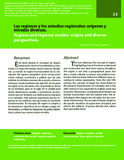Mostrar el registro sencillo del ítem
Las regiones y los estudios regionales: orígenes y miradas diversas
| dc.rights.license | http://creativecommons.org/licenses/by-nc-sa/3.0/ve/ | es_VE |
| dc.contributor.author | Cruz Jiménez, Diana Erika | |
| dc.date.accessioned | 2025-04-10T12:16:35Z | |
| dc.date.available | 2025-04-10T12:16:35Z | |
| dc.date.issued | 2025-04-10 | |
| dc.identifier.issn | 0798-3069 | |
| dc.identifier.uri | http://www.saber.ula.ve/handle/123456789/51571 | |
| dc.description.abstract | Este texto aborda el concepto de región, destacando cómo se ha entendido y construido a lo largo del tiempo desde diversas disciplinas. La noción de región ha trascendido de la concepción del espacio geográfico al de construcción social, cultural, económica y política que ha sido definida de distintas maneras de acuerdo a diversos enfoques. Desde mediados del siglo XIX, el concepto de región se ha vinculado a las características físicas de un territorio, pero en el siglo XX se amplió para incluir dimensiones sociales y económicas, reconociendo que las fronteras son edificaciones humanas y no naturales. Este artículo argumenta que las regiones no son estáticas, sino que están en constante transformación. El concepto de región se adapta a las situaciones específicas de un tiempo y lugar determinados, y refleja las relaciones de poder, identidad y cultura que existen dentro de ellas. | es_VE |
| dc.language.iso | es | es_VE |
| dc.publisher | SaberULA | es_VE |
| dc.rights | info:eu-repo/semantics/openAccess | es_VE |
| dc.subject | Región | es_VE |
| dc.subject | Regiones | es_VE |
| dc.subject | Construcción social | es_VE |
| dc.subject | Tiempo-espacio | es_VE |
| dc.subject | Escenario | es_VE |
| dc.title | Las regiones y los estudios regionales: orígenes y miradas diversas | es_VE |
| dc.title.alternative | Regions and regional studies: origins and diverse perspectives | es_VE |
| dc.type | info:eu-repo/semantics/article | es_VE |
| dc.description.abstract1 | This text addresses the concept of region, highlighting how it has been understood and constructed over time from various disciplines. The region is not only a geographical space, but also a social, cultural, economic and political construction that has been defined in different ways according to various approaches. Since the mid-19th century, the concept of region has been linked to the physical characteristics of a territory, but in the 20th century it was expanded to include social and economic dimensions, recognizing that borders are human constructions and not natural ones. This article argues that regions are not static, but are constantly transforming. The concept of region adapts to the specific situations of a given time and place, and reflects the relations of power, identity and culture that exist within them. | es_VE |
| dc.description.colacion | 33-40 | es_VE |
| dc.description.email | revistafermentum@gmail.com | es_VE |
| dc.description.email | diana7erika@gmail.com | es_VE |
| dc.description.frecuencia | Cuatrimestral | |
| dc.description.paginaweb | www.saber.ula.ve/fermentum | |
| dc.identifier.depositolegal | pp1991102ME302 | |
| dc.publisher.pais | Venezuela | es_VE |
| dc.subject.institucion | Universidad de Los Andes | es_VE |
| dc.subject.keywords | Region | es_VE |
| dc.subject.keywords | Regions | es_VE |
| dc.subject.keywords | Social construction | es_VE |
| dc.subject.keywords | Time-space | es_VE |
| dc.subject.keywords | Acenario | es_VE |
| dc.subject.seccion | Revista Fermentum: Artículos | es_VE |
| dc.subject.tipo | Artículos | es_VE |
| dc.type.media | Texto | es_VE |
Ficheros en el ítem
Este ítem aparece en la(s) siguiente(s) colección(ones)
-
Fermentum - Año 035 - Nº 102
enero-abril 2025


